Dell XPS 15 L521X: A Detailed First Look
by Jarred Walton on July 25, 2012 1:10 AM ESTDell XPS 15 Battery Life
Dell uses a 9-cell, 65Wh integrated battery in the XPS 15 that’s not user replaceable, which is similar to what we’ve seen in the previous generation XPS 15z as well as the MacBook Pro 15. Apple uses a higher capacity battery, and under OS X the MBP15 will generally offer superior battery life, but unless something has changed since our last look we would expect greatly decreased battery life under Windows via Boot Camp. Since the XPS 15 is designed to run Windows from the ground up, there isn’t a problem with lack of power optimizations, and the result is competitive battery life. The LCD was set to 50% brightness (109 nits) for our battery testing—or nine steps down from maximum if you’re using the keyboard shortcut.
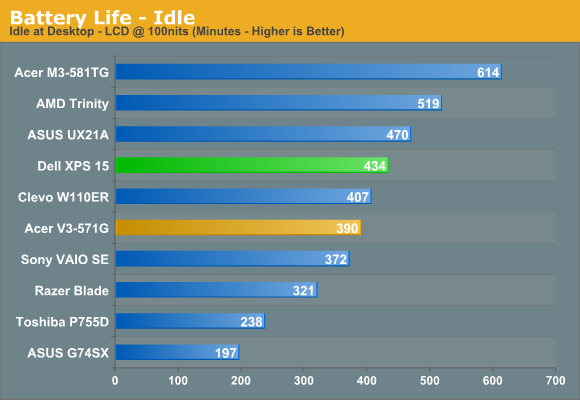
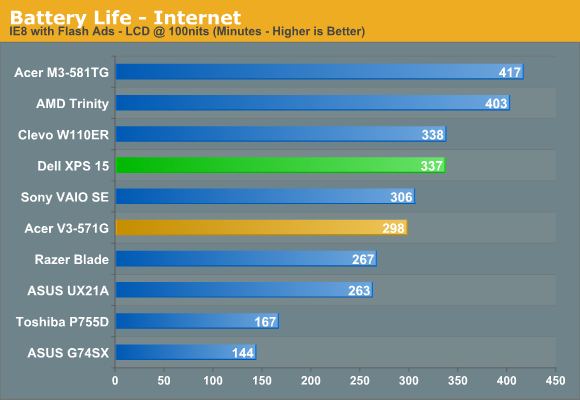
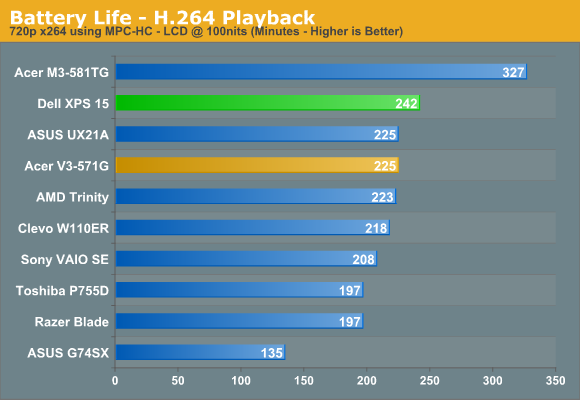
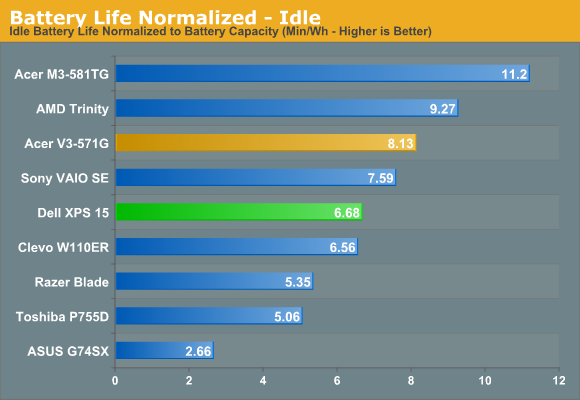
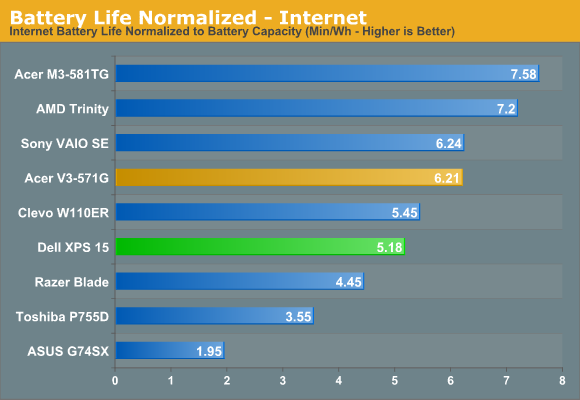
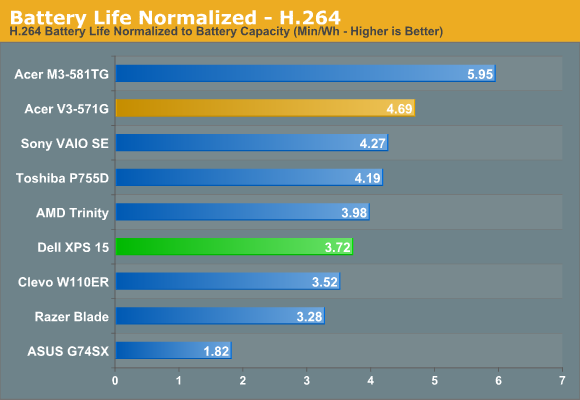
Idle battery life is just over seven hours, with a normalized result putting the XPS 15 ahead of everything except Ultrabooks and AMD’s Trinity. Put a more typical load on the laptops, like our Internet test, and we’re at five hours of useful battery life. If you’re doing lighter web surfing with a mix of office applications, you can expect somewhere around six hours of battery life. As for video playback, Dell manages just over four hours of 720p H.264 decoding; 1080p H.264 decoding drops that slightly to around 3.5 hours. That’s actually one of the lower results for battery life considering the battery capacity, though it’s worth noting that playback on higher resolution displays ends up being more taxing as there are more pixels to push. Overall, then, battery life is good and will be sufficient for most people to get through a day’s work without plugging in, particularly if they let the LCD turn off and/or the laptop go to sleep during periods of inactivity.










109 Comments
View All Comments
xype - Wednesday, July 25, 2012 - link
Never said it was the pinnacle. But feel free to educate me how above industry average growth is "struggling" or, alternatively, show me some data for the past 5 years that shows Apple’s sales dipping lower than those of their competitors.Unless, for some reason, Apple gets paid with magic dollars that increase their value after Apple receives them, their PC profits do not come about from "struggling".
But hey, since you told me, I’m gonna get a real hard grip on my desk now while you look for data to support your claims. Wheee!
ananduser - Wednesday, July 25, 2012 - link
Above average industry growth ? You should check Lenovo and Asus' numbers for above average growth, double digits. For the most recent quarter Apple stagnated.xype - Thursday, July 26, 2012 - link
Ugh. Yeah, most recent quarter. That totally negates the past, what, 5 years? Apple is doomed! o_Oananduser - Thursday, July 26, 2012 - link
I didn't say that. You seem to extract Apple out of the PC landscape like they were pushing PowerPC hardware. Not anymore. Ever since they switched to Intel their growth was steady but small. So no Apple does not have above average industry growth. Other PC OEMs do.CeriseCogburn - Sunday, July 29, 2012 - link
Hey you got overconfident and he upped the ante and provided the heat that destroyed your smug appletude.The least you should have done is take it like an appleseed, but instead you smarted off and made up a sucky strawman.
tsk tsk, Steve is disappointed. You're fired.
yyrkoon - Wednesday, July 25, 2012 - link
Except, those "PC makers" who are "retards" actually contribute to the technology specifications. For hardware used in your precious Apple systems.x86-64 CPU's /chipsets, nVidia graphics cards, SATA, PCIe, Thunderbolt, , etc, etc.
Matter of a fact. Apple did not even make the first laptop. Epson 1981, Microsoft 1982, Compaq 1988, IBM 1984, Radio Shack 1983 ( In collaboration with Microsoft ), and possibly NEC 1989 all had designs before Apple in 1989. Not to mention others dating back to 1979.
So who is thinking "differently" again ? Do not even get me started on OSX.
So, if not for the technology giants of the world. Apple would not even have existed. Like many others in the industry, they take the ideas from others, and improve on them. Improvement is also a subjective term in this situation.
xype - Thursday, July 26, 2012 - link
Who contributes to technology specifications? Dell? Asus? Acer? HP?Did Intel start targeting the ultra-low-power CPU specs because of all of these guys, who made the first "Ultrabook"?
And how "special" do you have to be to think I was claiming Apple made the first laptop? Duh?
Unibody aluminium enclosures, retina display, the ultrabook form factor, thunderbolt, etc are not popping up in Acers and Asuses and Dells first. I’m NOT claiming Apple is the end all be all (as some specialitos here seem to think), but they DO contribute their share to the ecosystem and claiming they don’t and that they are just "assembling" PC parts is reeking of butthurt, especially seeing how HP and now Dell seem completely unable to make "premium" laptops that don’t looks like MacBook knock-offs.
Which is my original point: it’s annoying that they don’t, because people are not buying only Macs and it would be really nice to have some hardware that actually looked different. They just don’t give enough of a shit.
yyrkoon - Friday, July 27, 2012 - link
The point was. Apple does currently makes a system that is based on PC ( x86 compatible ) parts. They do not come up with technology ideas. They buy decent / good parts and assemble them. Then they write a limited driver base into their operating system to support such hardware.Which in fact is a good idea, but very limited. General purpose computing, that is limited by software support. For software titles, and additional hardware. Then, it is also very proprietary in comparison to other alternatives. You're locked into their hardware, and software.
The reason why OEM PC vendors "dont give a shit" is that such systems cost a lot, and PC system purchasers are cheap. If you were to compare lets say Dell to Apple. I think you would find that Dell probably sells many more systems *This* is an "Apple" to Apples comparison. Now, as for who actually makes more money . . . I have no idea. Nor do I care.
As far as who actually contributes to PC technology. Try using google. I think you would very likely find Intel, AMD, IBM, supermicro, and Epson among them. Then, many others in the PC industry like Asus.
CeriseCogburn - Sunday, July 29, 2012 - link
A black keyboard area is a scourge on us all.Used to be you could see all laptop keyboards in the dark without back lighting, until the pliable masses were all doggy trained into loving black on everything - now they're just invisible past dusk. Pavlov man - the training is actually amazing.
Yeah, so strike one for the crap black keyboard and area, and I include the mindless drooling dogams in that strike as well.
That's also why they all make maccy looking clones- because the idiot masses respond like clockwork.
yyrkoon - Wednesday, July 25, 2012 - link
Jarred, how about setting processor affinity to 2 cores only ? Then retesting a game or two ? The results should be interesting.I'm thinking that game performance should get a boost, and CPU temps should drop some.